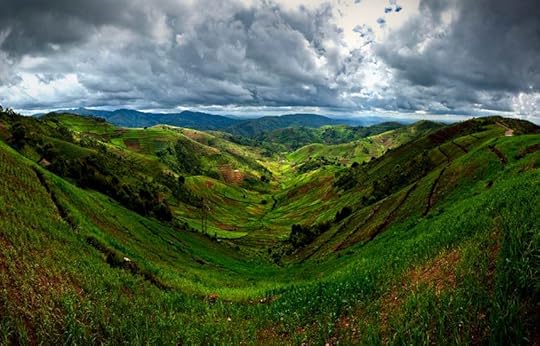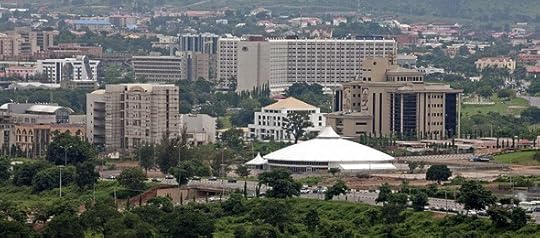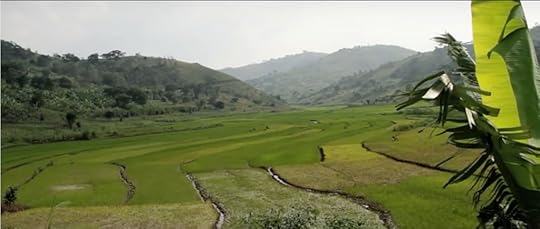What do you think?
Rate this book


224 pages, Paperback
First published August 24, 2016










War always takes it upon itself, unsolicited, to find us an enemy. I wanted to remain neutral, but I couldn’t. I was born with this story. It ran in my blood. I belonged to it.
The earth had moved imperceptibly beneath our feet. It did so every day in this country, in this corner of the world. We were living on the axis of the Great Rift, at the precise spot where Africa fractures. The people of this region mirrored the land. Beneath the calm appearance, behind the façade of smiles and optimistic speeches, dark underground forces were continuously at work, fomenting violence and destruction that returned for successive periods, like bad winds: 1965, 1972, 1988. A glowering, uninvited ghost showing up at regular intervals to remind us that peace is merely a brief interlude between two wars. This poisonous lava, the thick flow of blood, was ready to rise to the surface once more. We didn’t know it yet, but the hour of the inferno had come, and the night was about to unleash its cackle of hyenas and wild dogs.
Genocide is an oil slick: those who don’t drown in it are polluted for life.
I used to think I was exiled from my country. But, in retracing the steps of my past, I have understood that I was exiled from my childhood. Which seems so much crueler.
"Happiness is something you only see in the rear-view mirror. The next day? Look at it. Here it is. Slaughtering hope, making the horizon futile, crushing dreams. I prayed for us, Gaby, I prayed as often as I could. The more I prayed, the more God abandoned us, and the more faith I had in his strength. God makes us undergo these ordeals so we can prove to him that we don’t doubt him. It’s as if he’s telling us that great love relies on trust. We shouldn’t doubt the beauty of things, not even under a torturing sky. If you aren’t surprised by the cockerel’s crow or the light above the mountain ridge, if you don’t believe in the goodness of your soul, then you’re not striving anymore, and it’s as if you were already dead.”
“Tomorrow, the sun will rise and we shall try again" Prothé concluded.
“The war between Tutsis and Hutus … is it because they don’t have the same land?”
“No, they have the same country.”
“So … they don’t have the same language?”
“No, they speak the same language.”
“So … they don’t have the same God?”
“No, they have the same God.”
“So … why are they at war?”
“Because they don’t have the same nose.”
“This poisonous lava, the thick flow of blood, was ready to rise to the surface once more. We didn’t know it yet but the hour of the inferno had come, and the night was about to unleash its crackle of hyenas and wild dogs.”Innocence is lost!
War, without being asked, always takes care of finding an enemy. I wanted to remain neutral, but I couldn't. I was born with this story. It flowed into me. I belonged to it.Set in Burundi, Rwanda and France, Petit Pays tells the story of 10-year-old Gaby, who lives with his French father and Rwandan mother in an impasse in a comfortable district of Bujumbura. Gabriel's sheltered upbringing leaves him oblivious to the increasing tensions between the Hutu majority and the Tutsi minority (to which he, through his mother, belongs). As neighbouring Rwanda faces the outbreak of civil war and genocide, which spill over into Burundi, the innocence of Gaby and his group of friends is brutally shattered.
I had to leave. She told me to keep these words in memory of her: beware of the cold, watch over your secret gardens, become rich in your readings, your encounters, your loves, never forget where you come from...Petit Pays is a haunting coming-of-age story about what it means to belong and to grow up during a period where violence and resentments reach their peaks. It is a tale of loss, family and friends, disrupted lives, beautiful and painful memories, and the burden and gift of survival.
I am obsessed with this return. Not a day goes by without the country remembering me. A furtive noise, a diffuse smell, an afternoon light, a gesture, a silence sometimes, are enough to awaken the memory of childhood. "You won't find anything there but ghosts and a bunch of ruins", Ana keeps telling me, she never wants to hear about this "cursed country" again. I listen to her. I believe her. She has always been more lucid than me. So I push this idea out of my head. I decide once and for all that I will never go back there. My life is here. In France.The story begins as Gaby’s childhood memories, now living in France, resurface, triggered by his 33rd birthday that he spent alone. He thinks back on his upbringing, his home country and his family. How it all started and how it all fell apart.
What is our life like in Bujumbura? Can you tell me? Apart from this miserable little life?None of them were at home in Burundi, but only Yvonne felt displaced, yearning for the security of Paris, knowing full well that the tensions in Rwanda could (and would) spill into Burundi as well, endangering her life and the lives of her children. Michel, on his part, has made Bujumbura his little paradise, with domestic servants, sunny weather and a beautiful landscape – a paradise he refuses to leave, especially not due to the “hysterics” of his wife.
You fled the quietness of your France to find adventure in Africa. Good for you! I am looking for the security I never had, the comfort of raising my children in a country where one is not afraid to die because one is ...
Like Maman and her family, they had fled these problems and encountered new ones in Burundi - poverty, exclusion, quotas, xenophobia, rejection, scapegoating, depression, homesickness, nostalgia. Refugee problems.Michel was in Burundi by chance. He failed to recognise the mental toll of the life as a refugee that his wife lived. Despite her privileges, by being married to a white Frenchman, she still had to leave her family and home behind, with little hopes of ever coming back and feeling safe there.
My home? It was here. Of course, I was the son of a Rwandan woman, but my reality was Burundi, the French school, Kinanira, the dead end. The rest did not exist.For Gaby and Ana, Bujumbura truly is home. They don't know anything else. But the people around them don’t recognise them as Burundian. They are either seen as white and French, or Tutsi, even by their own family: “Mom retorted that her children were little Frenchmen, that they shouldn't bother everyone with their Rwandan stories.”
We knew every corner of the cul-de-sac and we wanted to stay there for life, the five of us, together.It is in those chapters that we met Gaby’s closest friends: the twins, Gino and Armand. And Francis who is somewhat of an outsider. Their dynamic reminded me a lot of Darling’s friend group in We Need New Names and I loved following these little misfits along on their adventures. Gaël Faye managed to capture what it means to be young, oblivious, innocent and full of hope and joy. Reading about Gaby’s carefreeness, his little games with his friends; it made my heart sing, it made me yearn for my childhood days and friends, and it frightened me because I knew that that bliss wasn’t supposed to last.
I can't remember when we started thinking differently. To consider that, in the future, there would be us on one side and, on the other, enemies, like Francis.As a reader, it is painful to witness how Gaby is forced to grow up, how he is put into situations that no child (or even adult) should ever be put into. Albeit, I found the Lord of the Flies-moment to be a little bit over the top it marked the death of childhood innocence quite illustratively.
We live. They are dead. Mom couldn't stand the thought. She was less crazy than the world around us. I didn't blame her, but I was afraid for Ana. Every night now, Mama asked her to go with her to her nightmare lands. I had to save Ana, to save us. I wanted Mom to go away, to leave us in peace, to rid our minds of the horrors she had lived through so that we could still dream, to hope for life. I didn't understand why we had to suffer too.Gaby and Ana become scared of their mom because she is crazy, because she scares them. When Gaby tells his father what how his mother haunts them at night, Michel decides to pack their bags and move with his kids back to France. Everything changes. Gaby and Ana are uprooted. Leaving their home, and their mother behind.
The genocide is an oil slick, those who did not drown are oiled for life.It is painful to bear witness to all of that. And yet, Gaël Faye invites you to take it all in, to pay respect to all the people who have survived through this trauma. In his poetic voice, he sheds light on so many important issues that aren’t often glossed over in the mainstream media; allowing people to take up space who are too often pushed to the margins.
On connaissait tous les recoins de l'impasse et on voulait y rester pour la vie entière, tous les cinq, ensemble.
J'ai beau chercher, je ne me souviens pas du moment ou l'on s'est mis à penser différemment. A considérer que, dorévenant il y aurait nous d'un côté et, de l'autre, des ennemis, comme Francis.
Ce jour-là, le 21 October 1993, nous avons eu droit au Crépsucule des dieux de Wagner.